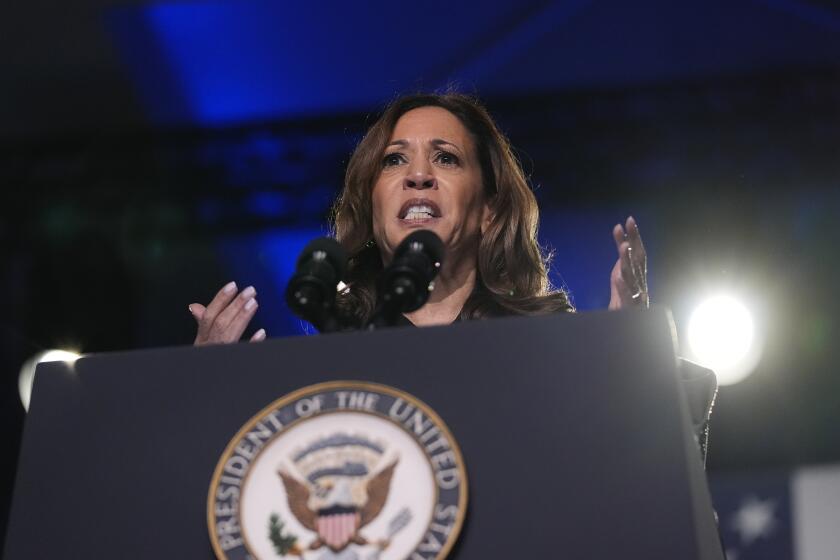Tension rises in Koreas as war games start up
The U.S. and South Korea on Monday began annual war games involving tens of thousands of troops, prompting North Korea to call its military into “full combat readiness,” saying it views the joint land and sea exercises as a prelude to an invasion.
The hostilities raised tensions on the Korean peninsula to their highest point in weeks as the U.S. and its allies anxiously awaited North Korea’s test launch of its most advanced long-range missile.
North Korean officials late last week declared that the isolationist nation could not guarantee the safety of South Korean passenger jets flying near its airspace during the 12-day exercises. Several airlines immediately announced that they would avoid North Korean airspace as a precaution.
Northern officials also cut off a military hotline, leaving North and South Korea without means of communication amid the escalating brinkmanship.
South Korea on Monday expressed regret over the suspension of what it said was a crucial channel of contact. Officials also said that 726 South Koreans had been barred from crossing into North Korea to the jointly run Kaesong industrial complex.
“We, the government, feel sorry that North Korea continues to take regrettable measures, although we are reacting with patience,” said South Korea’s Ministry of Unification spokesman Kim Ho-nyeon.
Meanwhile, U.S. military officials here tried to defuse tensions while stressing that the exercises, larger in scale and duration than in previous years, would go on.
“The primary goal is to ensure the command is ready to defend the [Republic of Korea] in the event it becomes necessary,” said U.S. Army Gen. Walter L. Sharp, commander of U.S. forces in South Korea.
He insisted that the war games were “a routine training exercise that takes place every year at about the same time. It is not tied in any way to any political or real-world event.”
Stephen Bosworth, the new U.S. envoy on North Korean issues, met Monday with South Korean officials. The former U.S. ambassador to Seoul arrived Saturday for four days of meetings.
Bosworth said he knew a tough job lay ahead.
“I have no illusions about what I have agreed to do. It is a very difficult mandate,” he told South Korean Foreign Minister Yu Myung-hwan, according to South Korea’s Yonhap news agency.
Usually testy in response to what it sees as provocations by conservative South Korean President Lee Myung-bak, North Korea has become more belligerent in its proclamations. Experts say North Korea is particularly incensed at suggestions by the U.S. and Japan that they could if necessary shoot down any long-range test missile launched by the North.
North Korean officials in Pyongyang have said they are planning to launch a communications satellite and declared Monday that they would view any outside interference as an act of war.
The military will “deal merciless retaliatory blows” if outside forces intrude on North Korea by “even one inch,” said a North Korean news agency. “The Lee Myung-bak group of traitors and the U.S. and Japanese aggressors would be well advised to behave with discretion.”
North Korea has the world’s fifth-largest military, by some estimates more than 1 million troops strong.
The U.S.-South Korea military exercises, called Key Resolve-Foal Eagle, will involve several U.S. destroyers, the aircraft carrier John Stennis and 26,000 U.S. service members, including 13,100 stationed outside South Korea.
Experts here say verbal bombast is expected from North Korea when it feels under threat. “The U.S. and South Korea do this military exercise annually, and historically North Korea has been oversensitive,” said Kim Seung-hwan, a senior associate at the Center for Strategic and International Studies.
He said the impoverished nation normally resorts to words over weapons. “It costs a lot of money, such as in gas, fuel and observation,” he said. “North Korea has used its hostile rhetoric over military drills.”
North Korea’s reported plans to test-fire its Taepodong 2 missile also come at a crucial time. The last test in 2006 was a failure, and the regime of hard-line ruler Kim Jong Il believes it needs a launch to boost public opinion, experts say.
On Sunday, North Korea held parliamentary elections, and new members are expected to reelect Kim as leader in early April.
Pyongyang watchers say the government might also announce the appointment of Kim’s third son, Kim Jong Un, to succeed his father, who has reportedly suffered several strokes. Many thought the younger Kim would run for a parliament seat this year, but that did not prove to be true.
--
More to Read
Sign up for Essential California
The most important California stories and recommendations in your inbox every morning.
You may occasionally receive promotional content from the Los Angeles Times.











